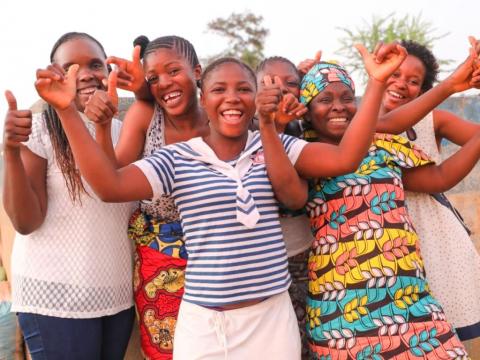By Mabinty M. Kamara
Human rights campaigners have welcomed government’s decision to lift the ban on a 10-year policy they say discriminated against girls by prohibiting those who were pregnant from attending schools.
In a joint statement by four leading campaign groups, they praised the move by government, saying it recognized the place of girls in society.
One of the groups, Equality Now, an international human rights watchdog, described it as a new beginning for girls.
“This is wonderful news! It is recognition in Sierra Leone that girls have a right to learn; that girls have rights! That the girl child is an equal human being to her male counterparts in society,” Judy Gitau, Equality Now’s Regional Coordinator for Africa, said in the statement that was quoted signed by three other groups: Defense for Children International, Women Against Violence and Exploitation in Society (WAVES), and the Coalition for Girls Education (CWS-SL).
The group said the move by the government is a step forward for justice as the country complied with the ECOWAS judgment and specific orders from the court.
The policy to ban girls who were visibly pregnant from attending schools was first introduced by the Ministry of Education in 2010, under the Ernest Bai Koroma administration. But it became a major concern in 2015, during the West African Ebola epidemic, when teenage pregnancy rates increased. There were condemnations from both local and international quarters.
The reversal of the decision comes after last year’s ruling by the regional ECOWAS court that the law was “discriminatory” and went against the rights of girls, which is in the African Charter, a document Sierra Leone is a signatory to.
Equality Now was among a coalition of campaign groups that took the case to the regional court.
The court, among others, called on the Sierra Leone government to reverse the decision and implement several measures geared towards ensuring equality for girls and boys.
The Ministry Education said in its press statement that the policy would now take account of ‘Radical Inclusion’ and comprehensive safety of all children in the education system.
“This is an eloquent testament to the government’s commitment to accessible and quality education (SDG4) and gender equality (SDG 5). We recognize that pregnant girl’s school attendance has become a divisive issue across legislative, educational and Civil Society spaces for the last ten years,” the statement partly reads.
The United Nations also praised the decision b=of the government.
The UN Population Fund (UNFPA) said in a statement that the move was geared towards ensuring equal rights and inclusion in line with efforts to achieve the Sustainable Development Goals (SDG).
“As a co-chair of the sexual reproductive health taskforce established in December 2019, I personally applaud the Minister of Basic and Senior Secondary Education for taking onboard the recommendations of the taskforce to allow girls to continue attending school during pregnancy. It is worthy to note that such a move contributes to fulfilling UNFPA’s mission to a world where every young person’s potentials is fulfilled,” Dr Kim Eva Dickson, UNFPA Country Representative to Sierra Leone, said in a statement.
The issue was a divisive one in the public, as many Sierra Leoneans supported the policy on the basis of religious and moral grounds.
This division was especially visible between rights groups and conservative religious leaders.
Whiles the rights campaigners insisted that no girl must be deprived from school, no matter their condition, the religious leaders warned against setting a bad example by allowing pregnant girls to attend school.
School authorities who spoke to Politico about Monday’s announcement expressed mixed feelings. While some sounded satisfied with the decision, others cited challenges they feared would come along as a result of the decision.
Alhaji Karimu Sesay, Acting Principle of the Ahmadiyya Muslim Secondary School, a school operated under a co-educational system, told Politico that they would now embark on sensitizing the pupils against discrimination.
“But we will have to sensitize them to prevent pregnancy, looking at the challenges that their colleagues will be facing in class either physically or psychologically. As a co-educational school, we will also have to counsel the other pupils against discrimination and possible provocation that may discourage the girls from coming to schools,” Sesay said.
Copyright © 2020 Politico Online








